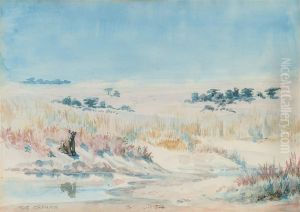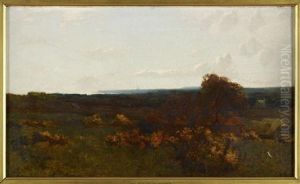Robert, Sir Baden-Powell Paintings
Robert, Sir Baden-Powell, born Robert Stephenson Smyth Baden-Powell on February 22, 1857, in Paddington, London, was a British Army officer, writer, and founder of the worldwide Scout Movement. He came from a family of scholars and military men; his father, Professor Baden Powell, was a prominent mathematician and theologian, and several of his brothers also had distinguished careers in the military and other fields. Baden-Powell was educated at Charterhouse School, where he developed a keen interest in the outdoors, adventures, and the skills of scouting, which would later form the foundation of his contributions to youth education and training.
After finishing school, Baden-Powell joined the British Army in 1876, serving in India and Africa. He distinguished himself in the Second Boer War in South Africa (1899–1902), particularly during the Siege of Mafeking, where his leadership and innovative tactics in defense of the town were widely celebrated. His experiences during the war, coupled with his natural flair for reconnaissance and scouting, led him to emphasize the importance of scouting and reconnaissance in military training.
Baden-Powell's military career served as a prelude to his later work in developing the Scouting movement. In 1907, he organized a camp on Brownsea Island for 20 boys from diverse social backgrounds to teach them about outdoor activities, leadership, and self-reliance. This event is considered the birth of the Boy Scouts. The following year, he published 'Scouting for Boys,' a book that outlined his vision for the Scouting movement and became an immediate success. The book, drawing on his military experiences and his love for the outdoors, was a manual of survival skills, moral grounding, and citizenship. It captured the imagination of thousands of boys and led to the formation of Scout troops all over the world.
Baden-Powell's ideas also inspired the formation of the Girl Guides and Girl Scouts, led by his sister Agnes Baden-Powell and later his wife, Olave Baden-Powell. Recognizing the significant impact of the Scouting movement, he retired from the army in 1910 to devote himself full-time to Scouting. He traveled the world to promote Scouting and wrote numerous books on the subject. His work earned him widespread recognition, including being knighted by King Edward VII in 1909.
Sir Robert Baden-Powell spent his later years in Kenya, where he continued to write and promote Scouting. He died on January 8, 1941, in Nyeri, Kenya. Today, he is remembered as the visionary founder of the Scout Movement, which has grown to include millions of members in countries around the world, making it one of the largest and most influential youth organizations globally. His legacy is celebrated for promoting values such as leadership, good citizenship, and outdoor skills, and for bringing together young people from diverse backgrounds to work towards common goals.


